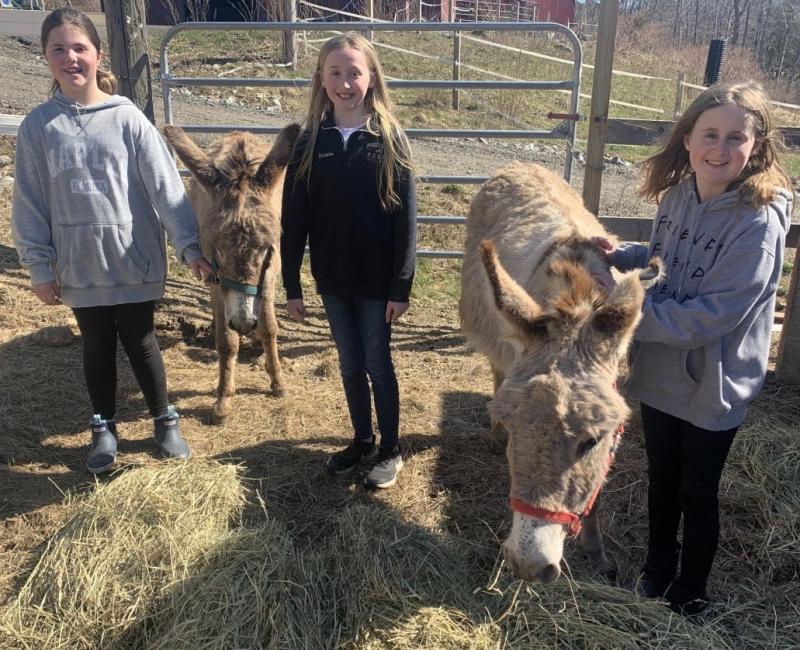‘Charlie and Friends’ providing a new life for rescue donkeys and horses
On March 10, Burke’s Island Farm welcomed six new friends – all donkeys – who needed rehabilitation toward finding a second purpose in life. The project is called “Charlie and Friends Second Stride Rescue” and was founded a year ago. The nonprofit’s mission is rescuing slaughter-bound, abused and neglected horses and donkeys through rehabilitation and care in a safe, therapeutic environment. Grace was one of the six donkeys who arrived at the farm. The nonprofit bought Grace and her five friends at an auction. The purchase likely saved them from the slaughterhouse, according to Becky Abbott, the nonprofit’s president.
A few days into Grace’s arrival, it was apparent she was too ill for rehabilitation and was “put to sleep.” Grace was one of two donkeys who couldn’t survive long enough in the first week. On the Charlie and Friends Second Stride Rescue Facebook page, Abbott posted “She was the sweetest and most gentle soul who deserved so much more in life. We are thankful to have helped Grace in the short time that we knew her, and that she crossed the rainbow bridge knowing that someone loved and cared for her.”
The other four are on their way to good health. The donkeys are now receiving regular veterinarian visits, a healthy diet and exercise. Abbott described all six donkeys as being in poor health when they were bought at an out-of-state auction. “They were all in pretty rough shape,” Abbott said. “They had poor teeth which led to their being emaciated and leading to other health problems due to a lack of nutrients,” she said.
But euthanizing two donkeys so soon into their arrival wasn’t a surprise to Abbott. “It was horrible having to do that,” she said. “But in the beginning, we all agreed to buy any animal to save them from the kill pens. If they were going to be euthanized, we wanted it done with dignity and not forced to travel thousands of miles to be killed.”
A month later, rehabilitation is working wonders for the other four rescues. A key recovery factor may be love and attention received from the adult and youth farmhands. For the past seven years, Abbott has operated a kids’ day program with her business partner Amy Reny at the farm. Children ages 5 to 18 spend time working on the farm assisting with caring for the horses, and now donkeys. They feed the animals, clean their stalls and exercise them. At first, Abbott reported the four donkeys had trouble adapting to their new environment, but now flourish with so many friendly faces caring for them.
She described the donkeys’ initial interaction as showing signs of trauma. “At first, they wouldn’t eat out of your hand. Two to three days later, they grew to love people, and now they are starved for attention,” she said. Many of the campers joined initially to ride horses, but they also grew to enjoy farm work. “I like both riding the horses, and the chores,” said camper Annie Whitney.
As the donkeys begin to regain their health, they will likely be re-sold to new owners. Abbott calls this “re-homing.” The nonprofit’s main goals are “buying, shipping, rehabilitating (and) boarding the animals” prior to re-homing them. Several years ago, the nonprofit began with another purpose. Abbott and Reny created a 501(c)3 for therapeutic riding. But the nonprofit had been dormant for several years before the two had a new idea.
They found a new purpose for the nonprofit and created a program for rehabilitating horses and donkeys destined for slaughter in Mexico and Canada. The board of directors was created with Paul Roberts and Ronnie Cohen joining Abbott and Reny. About a year ago, the board worked on networking and creating an organizational and fiscal structure.
Cohen serves as the nonprofit’s treasurer. He also owns a farm in Edgecomb. Cohen joined the board because he thought it was a worthy cause. “I really loved the idea behind it. I know not every animal can be saved, but it’s important to do what we can,” he said.
A major challenge in the nonprofit’s operation is money. The board is working on its first major fundraiser. The nonprofit is searching for artists to paint carousels for an upcoming August auction. “We’ve got to find ways to keep the nonprofit running. We need to raise money to pay for the vet bills, grain and hay, purchasing and transporting our animals,” Abbott said.
Burke’s Island Farm is on 20 Lindsay Road in Boothbay.
























